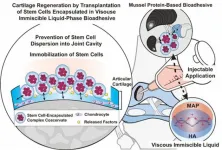(Press-News.org) Cigarette filters are the world’s most common form of litter. Researchers from the University of Gothenburg can now show that the filters leak thousands of toxins and plastic fibres that are toxic to aquatic larvae. The researchers are therefore calling for these filters to be completely banned.
On the footpath, at the bus stop, in the park and on the beach. You can hardly avoid seeing cigarette butts in the streetscape. And these butts aren’t just butt-ugly to behold – they’re also really bad for the environment. A research group at the University of Gothenburg has shown in a study that microfibres and the chemicals that leak out of the filters in cigarette butts are toxic to aquatic larvae.
“The filter is full of thousands of toxic chemicals and microplastic fibres, so it’s not just any piece of plastic that’s being discarded into the environment. It’s hazardous waste,” says Bethanie Carney Almroth, Professor of Ecotoxicology at the University of Gothenburg.
Cigarette filters killed mosquito larvae
In the study which has been published in the journal Microplastics and Nanoplastics, the researchers tested the effects of the toxins that are found in the filter after smoking, as well as the substances that are in the filter from the start, on aquatic mosquito larvae. It turns out that the toxins lead to a 20% higher mortality rate among mosquito larvae. Previous research has shown that the toxins in the filters also have adverse effects on many other aquatic organisms. For example, fish can die if they are exposed to concentrations corresponding to the toxins exuded by barely two cigarette butts in one litre of water for four days.
“Cigarette filters are also a major source of the microplastics that find their way into our environment – something we know has a major negative impact on biological life. The EU has already classified cigarette filters as hazardous waste,” says Professor Carney Almroth.
Cigarette butts are thrown on the ground
From the turn of the year, it will be the tobacco producers who have to pay for cleaning up cigarette butts. But it’s not enough to just put out more ashtrays. The researchers also observed in the study how smokers in Gothenburg behave when it’s time to put out their cigarettes. It turns out that many people throw their cigarette butts on the ground even if there are ashtrays nearby.
“The clean-up costs the municipalities millions of kronor, but there will still be many cigarette butts in the environment. We are now conducting a survey of plastic litter across all of Sweden with the aid of community science in what we’re calling the Plastics experiment. That way, we can work with school children and others to get better figures on where and how many cigarette butts with filters are found in the environment, in addition to other problematic plastic products” says Professor Carney Almroth.
Ban the filters!
She doesn’t think there are any good arguments at all for filters to remain a component of cigarettes. Along with other experts, Professor Carney Almroth has written an opinion piece in the magazine Science of the Total Environment arguing that cigarette butts are not just the most common litter item in the world, they are also just a marketing ploy that do little to protect the smoker, as many people believe they do.
“That’s why they have to be taken off the market entirely,” says Professor Carney Almroth. “It’s not the right approach to focus on making tobacco producers pay for cleaning up the filters. The problem should be prevented in the first place, rather than cleaned up later,” says Professor Carney Almroth.
Scientific journal article in Microplastics and Nanoplastics: Smokers´ behaviour and the toxicity of cigarette filters to aquatic life: a multidisciplinary study
Opinion piece in Science of the Total Environment: Time to kick the butt of the most common litter item in the world: Ban cigarette filters
Link to the Plastics experiment: https://forskarfredag.se/massexperiment/plastexperimentet/
Facts in brief about cigarette filters
Cigarette filters were invented in the 1950s and are today found in 90% of cigarettes sold.
It is estimated that 4.5 trillion cigarettes with filters are smoked and butted every year. 65% of these butts are not disposed of in a waste bin or ashtray.
Smoked cigarette butts can contain 7,000 different chemicals, while the unused filters contain 4,000 chemicals, many of which are toxic.
Each filter consists of approximately 15,000 microplastic fibres. A total of 0.3 million tonnes of plastic fibres are released into the environment from cigarette butts every year. This is about the same amount as from all the household washing machines in the world.
Studies show that the filters themselves can be a health hazard for the smoker because plastic fibres can become dislodged from the filters and breathed into the lungs of the smoker. END
Cigarette butts leak deadly toxins into the environment
2023-05-03
ELSE PRESS RELEASES FROM THIS DATE:
Study questions long term beta blocker use to curb further heart attack risk
2023-05-03
The accepted clinical practice of using beta blockers over the long term to curb the risk of further heart attacks or death doesn’t seem to be warranted in patients who don’t have heart failure, suggests a large study published in the journal Heart.
The researchers found no difference in these risks between patients taking beta blockers more than a year after their heart attack and those who weren’t on these drugs.
Beta blockers are a class of drugs that are predominantly used to manage abnormal heart rhythms, ...
Fresh hope for Australians living with chronic back pain
2023-05-03
Long-term sufferers of chronic back pain experienced dramatic reductions in pain and related disability that remained at their one-year follow-up after taking part in a new treatment tested by Curtin-Macquarie-Monash University research.
Published today in the leading medical journal The Lancet, the research found large clinically significant improvements in the intensity of pain and pain-related disability among almost 500 people who had been seeking help for their pain for an average of four years before trialling the new treatment.
The treatment, which delivered a healthcare and work productivity saving of more than $5000 per person, took a whole-person approach ...
Dogs may be at risk from high levels of lead from shotgun pellets in raw pheasant dog food, study finds
2023-05-03
PRESS RELEASE FROM THE UNIVERSITY OF CAMBRIDGE
EMBARGOED UNTIL: 01:00 BST / LONDON TIME WEDNESDAY 3 MAY 2023
Paper available at: https://drive.google.com/drive/folders/1GNT9-oVOFTREzjGTSGMK7nIUvlYR61PE?usp=sharing
Dogs may be at risk from high levels of lead from shotgun pellets in raw pheasant dog food, study finds
Researchers tested samples of raw pheasant dog food and discovered that the majority contained high levels of lead that could put dogs’ health at risk if they eat it frequently. ...
Why mosses are vital for the health of our soil and Earth
2023-05-03
Some people see moss growing in their gardens as a problem, but what they may not realise is this ancient ancestor of all plants is bringing lots of benefits to our green spaces, such as protecting against erosion.
Now a massive global study led by UNSW Sydney has found mosses are not just good for the garden, but are just as vital for the health of the entire planet when they grow on topsoil. Not only do they lay the foundations for plants to flourish in ecosystems around the world, they may play an important role mitigating against climate change by capturing ...
Hongkui Zeng elected to the National Academy of Sciences
2023-05-03
Hongkui Zeng, Ph.D., Executive Vice President and Director of the Allen Institute for Brain Science, a division of the Allen Institute, was today elected to the prestigious National Academy of Sciences for her work to understand the cells and connections in the mammalian brain, and leading the development of tools and openly available data resources that accelerate brain research worldwide.
“I am deeply honored to become a member of the National Academy of Sciences, joining more than 3,000 brilliant scientists around the country and the world,” said Zeng. “I feel incredibly fortunate to work at the Allen Institute alongside ...
Dementia and self-harm: why it's crucial to support patients in first year after diagnosis
2023-05-03
People diagnosed with dementia are more likely to self-harm within the first six to 12 months after initial diagnosis, highlighting the need for health services to offer more follow-up support in this crucial period.
In what is believed to be the largest study of its kind, researchers with expertise in medicine, psychiatry and psychology at UNSW Sydney looked at NSW hospital data captured for more than 180,000 people admitted to hospital between 2001 and 2015.
The researchers analysed statistics relating to two cohorts of patients admitted to hospital: 154,811 people recorded as having dementia, and ...
Boxing can take the fight to Parkinson’s Disease
2023-05-03
When we think of boxing, it’s understandable many of us wouldn’t associate it with being ‘good’ for our brains.
However, new Edith Cowan University (ECU) research undertaken in partnership with The Perron Institute and boxer Rai Fazio has shown the sport — without an opponent — could be a valuable way for people suffering Parkinson’s Disease (PD) to improve their quality of life.
Also collaborating with Sir Charles Gairdner Hospital and the University of Western Australia, ECU researchers had 10 people with early-stage PD perform three one-hour boxing sessions per week, over 15 weeks.
Rather ...
HKU’s innovative research novelties excel at 48th International Exhibition of Inventions of Geneva
2023-05-03
The University of Hong Kong (HKU) triumphed at the 48th International Exhibition of Inventions of Geneva, winning a total of 19 awards, including two special grand prizes Invention & Innovation CAI Award (China Delegation), and Prize of the Delegation of Malaysia. The results were announced yesterday (April 28).
Research teams from Faculty of Architecture, Faculty of Engineering, Faculty of Science, LKS Faculty of Medicine, and two HKU Inno Laboratories, established under the Hong Kong Government's InnoHK programme, garnered two special grand prizes, one Gold Medal with the Congratulations of the Jury, six Gold Medals, six Silver Medals ...
A novel stem cell adhesive using mussels
2023-05-03
Cartilage is a tissue that protects bones by providing shock absorption and facilitates smooth joint movement. Unfortunately, due to its limited intrinsic healing capacity, stem cell transplantation is a promising therapeutic approach to address cartilage inflammation and damage, as well as to promote cartilage regeneration. However, a major limitation of this technique is the rapid disappearance of transplanted stem cells from the smooth cartilage surface and fluidic environment around cartilage, resulting in less effective treatment outcomes. Recently, a joint team of researchers from POSTECH, Dongguk University Medical Center, and Nature Gluetech in Korea ...
Virginia Tech researchers study the crowdsourced investigation of Jan. 6, 2021
2023-05-03
How has online sleuthing successfully replaced wanted posters?
Researchers within the Virginia Tech Department of Computer Science answered this question by studying the crowdsourced online investigation that followed the Jan. 6, 2021, insurrection at the U.S. Capitol.
“These online communities can provide real value, if they’re organized in the right way,” said Kurt Luther, associate professor of computer science and history. “These aren’t just digital witch hunts now that make false identifications. They can really make solid contributions to ongoing investigations by getting images in front of people, which ...







